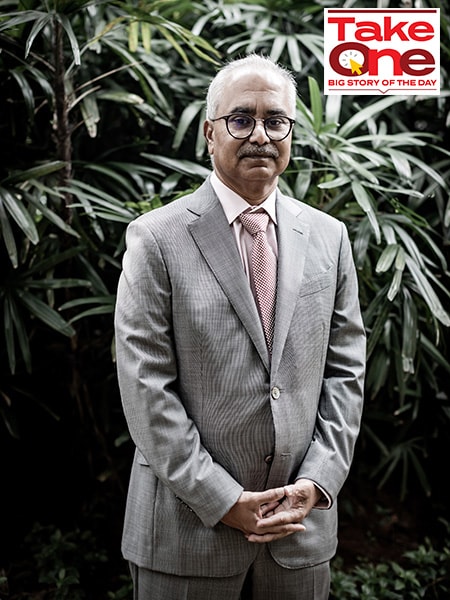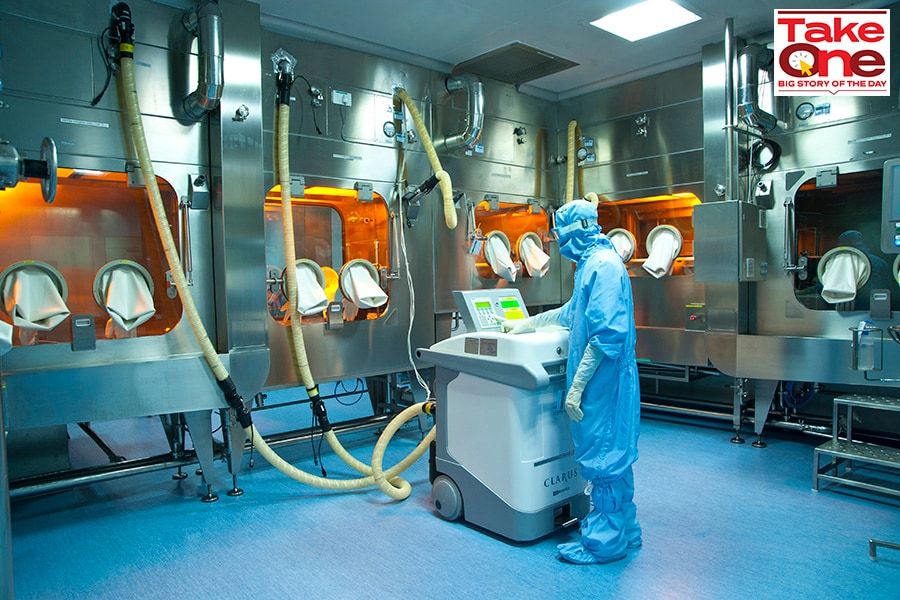It’s been a few days of anxious wait for India’s third largest pharmaceutical company, Dr Reddy’s.
In all likelihood, the Centre will give it some much needed reprieve soon, as the Subject Expert Committee (SEC) of India’s Drugs Controller General of India (DCGI) meets today to consider the Hyderabad-based company’s application seeking emergency use authorisation for the Sputnik V vaccine. The meeting is currently underway and a result could be expected later today or by February 25, unless the government seeks further data from the company for its clinical trials.
Admittedly a late entrant into India’s Covid-19 vaccine race, Dr Reddy’s is currently conducting phase 3 clinical trial in India. Globally, the Sputnik V vaccine is currently in use in 30 countries, including Russia, Belarus, Argentina, Bolivia, and the UAE among others.
In September 2020, Dr Reddy"s had partnered with the Russian Direct Investment Fund (RDIF) to conduct the clinical trials of the Sputnik V and for its distribution rights in India. As part of the review process, Dr Reddy"s had presented the safety profile of the phase 2 study, and interim data of the phase 3 study.
“Sputnik V has demonstrated an efficacy rate of 91.6 percent in the interim analysis of the phase 3 clinical trial, which included data on 19,866 volunteers in Russia, who received both the first and second doses of the vaccine," Dr Reddy’s had said in a statement on February 19. “Sputnik V maintained a consistent efficacy at 91.8 percent even among the group of 2, 144 volunteers over 60 years old."
India is currently in the midst of the world’s largest vaccination program involving two vaccines. The first one, Covishield, commonly known as the AstraZeneca vaccine is manufactured by the Pune-based Serum Institute of India, the world’s largest vaccine maker. Serum Institute has tied up with British pharmaceutical company, AstraZeneca to manufacture and sell the vaccine in India. The other vaccine supplier is the Hyderabad-based Bharat Biotech, which had indigenously developed Covaxin. So far, the Indian government has administered 11 million vaccines as part of its vaccination program that began on January 16.
Covishield, based on a genetically modified version of a common cold virus that infects chimpanzees has an efficacy of 63.09 percent against symptomatic Covid-19 infection. Covaxin, meanwhile, is yet to announce its efficacy data which is only expected in the next two weeks. Covaxin was given permission for restricted use “in clinical trial mode" in early January this year by the national regulator, despite the lack of phase 3 efficacy data.
"The efficacy of Sputnik V was reported to be 91.6 percent by the Lancet, which is an impressive development in the fight against Covid-19," GV Prasad, the co-chairman and managing director of Dr Reddy"s Laboratories said on Feb 19. “The initiation of the EUA process will be a critical step forward for us in ensuring speedy access to the Sputnik V vaccine in India."
Sputnik V was developed by Russia’s Gamaleya National Research Institute of Epidemiology and Microbiology and registered by the Russian health ministry as the world’s first Covid-19 vaccine based on the human adenoviral vector platform. Dr Reddy’s, which barely had any vaccines in its portfolio had moved in July to quickly partner with the institute despite global concerns about the efficacy of the vaccine. At that time, the company was already late into the vaccine race, with all the other Indian pharmaceutical companies already developing their vaccines or having partnered with other global makers.
![opening_reddy lab_bg opening_reddy lab_bg]()
“All the players had tied up with somebody or the other, so it was our turn to tie up with the Russian Gamaleya Research Institute and RDIF," Prasad had told Forbes India soon after the company partnered with the Russian government. The Sputnik V is based on human adenovirus, a common cold virus that is fused with the spike protein of the coronavirus to stimulate an immune response.
“The vaccine has become a target of politics, but we will go with the science," Prasad had told Forbes India immediately after partnering with the Russian government. “We have all the data. The Lancet published an article. It’s quite transparent what they’re trying to do, and I don’t see that as a concern."
Late to the Party
Dr Reddy’s currently has a deal to distribute 100 million doses of the vaccine in India, although it hasn’t disclosed how much the deal was struck at. In addition, the company has also not ruled out the eventual possibility of manufacturing the vaccine in India.
“We understand we are late in the game, so we need to accelerate whatever we’re doing through partnerships," Prasad had told Forbes India. “Our business initially will depend on partnerships, before we build our own capabilities. That is the idea… for us right now, the priority is short term—to see how we can help the Russian vaccine succeed in India, manufacture in India and make it available to patients."
India is the second-worst affected country in terms of Covid-19 cases and is currently the 14th worst hit in terms of active cases. The country has nearly 1.5 lakh cases. “Our spend is only for the clinical trial and it’s not large," Prasad had told Forbes India. “Money is not what we are looking at. We are looking at the solution, and at some point economics will become important… we will deal with it at that time."
The company’s decision to foray into the vaccine race also came at a time when it had stayed away from vaccines for more than two decades. The last time the company had dabbled with vaccines was in the early 2000s when it manufactured vaccines for Hepatitis B. “Vaccine is not a big play for us," Prasad had said. “But we see this as something we’re doing for our patients. Certainly, we are looking at vaccines as a space. We were never a big player, in fact, not a player at all in vaccines."
All that changed as India’s Covid-19 cases surged and the company decided to foray into partnering with a global drug maker for Covid-19 vaccine sometime in July this year.
GV Prasad and his brother in law, Satish Reddy, the chairman of Dr Reddy’s, had given the mandate to Deepak Sapra, the CEO of API (active pharmaceutical ingredient) and pharmaceutical division to initiate the talks with the Russian government. For long, Dr Reddy’s had a special relationship with Russia. In 1992, Russia was the first country it forayed into, barely eight years after it began operations. Today, its business in Russia accounts for over ₹2,000 crore annually—over 10 percent of the consolidated revenue.
“The meetings would go on for long and sometimes run late into midnight or on Sundays," Sapra had told Forbes India. “By then, we had become used to working round the clock. They were able to communicate the science behind it, and were forthcoming." The deal was finally struck in September.
By January, the company announced that it had received approval from the Drugs Control General of India (DCGI) to conduct phase 3 clinical trial on 1,500 subjects. Earlier, the Data and Safety Monitoring Board (DSMB) reviewed the safety data from the phase 2 clinical trial, conducted on some 100 volunteers, and found no safety concerns.
What Happens Now?
Once the approvals are in place, Dr Reddy’s is likely to sell the vaccine to the Indian government who will then make it part of its large vaccination drive. On February 24, the government announced that those above 60 years of age and those above 45 years of age with comorbidities will be vaccinated at 10,000 government and over 20,000 private vaccination centres from March 1. The vaccine will be given free of cost at government centres.
According to the government’s plan, the phased rollouts of Covid-19 vacines will initially see ten million health care and 20 million frontline workers being vaccinated, followed by 270 million senior citizens and people with co-morbidities like diabetes, hypertension, organ transplants etc. In all, 300 million people are targeted for inoculation by July this year.
Already, the government has laid out plans to procure some 55 million doses of the Covishield vaccine from the Serum Institute of India. In contrast, only about 2.5 million doses of Covaxin, produced by Hyderabad-based Bharat Biotech and the ICMR have been supplied to states in the country.
Sputnik, however offers India an option to quickly ramp up the vaccination process, even as India has begun to see a surge in Covid-19 cases. Across five states of the country, cases have begun to see a rise, including Mumbai, where the Maharashtra state government is threatening further lockdowns if cases are on the rise.
“One major limitation in the national Covid-19 vaccination campaign is the supply of vaccine doses, and adding Sputnik V to that supply chain will certainly help," Satyajit Rath, a scientist at the National Institute of Immunology and the adjunct professor at the Indian Institute of Science Education and Research says. “Sputnik V is similar to the Oxford-AstraZeneca-SII vaccine in being adenovirus-based, although it uses a different pair of adenoviruses. There is some effort globally to mix adenovirus-based vaccines from different sources in the dosing schedule if those efforts begin to show good results, having both these vaccines available will help a bit further, too," Rath explains. “This is not going to be the only one there will be more and more vaccines passing the regulatory requirements for emergency usage and adding to the vaccine supply available. The logistical catch is going to be how to decide which vaccine is to be supplied where and when, for the most optimal vaccine distribution plan. "
The Sputnik V, with its high efficacy rates, claims very low allergies after administering, and can be stored between 2 degree Celsius and 8 degrees, making it easier for countries such as India in handling and logistics, since the country does not have a robust cold storage ecosystem. In early February, India had rejected global pharmaceutical major, Pfizer’s request for emergency use authorization following certain serious adverse events (SAEs) globally and because it had not generated adequate information from local trials in the country.
“If I understood correctly, Pfizer"s application was turned down because there are no phase 1 or phase 2 clinical trials for that vaccine in India," adds Rath. “That is not the case for either the Oxford-AstraZeneca-SII vaccine, or for the Gamaleya Sputnik V vaccine. Both of those have in-India phase 1 and phase 2 trial results. So the most likely expectation is that Sputnik V will get an emergency use authorisation similar to that given to the Oxford-AstraZeneca-SII vaccine. Of course, even if approval is given, supply schedules will be the real test. We should keep in mind that, even by government data, only one-tenth of all vaccine doses in the country so far have been of the ICMR-Bharat Biotech vaccine."
Meanwhile, the developers of the Sputnik V vaccine are also working collaboratively with AstraZeneca on a joint clinical trial to improve the efficacy of AstraZeneca vaccine, or the Covishield vaccine. The vaccine currently sells at less than $10 (Rs 750) per shot, according to the RDIF, and has already been administered to more than 2 million people worldwide.
“If there is a solution, this world can afford it," Prasad had earlier said. “Nobody is going to profiteer from the vaccine."
Over to the Subject Expert Committee now.

 GV Prasad, the co-chairman and managing director of Dr Reddy"s Laboratories
GV Prasad, the co-chairman and managing director of Dr Reddy"s Laboratories